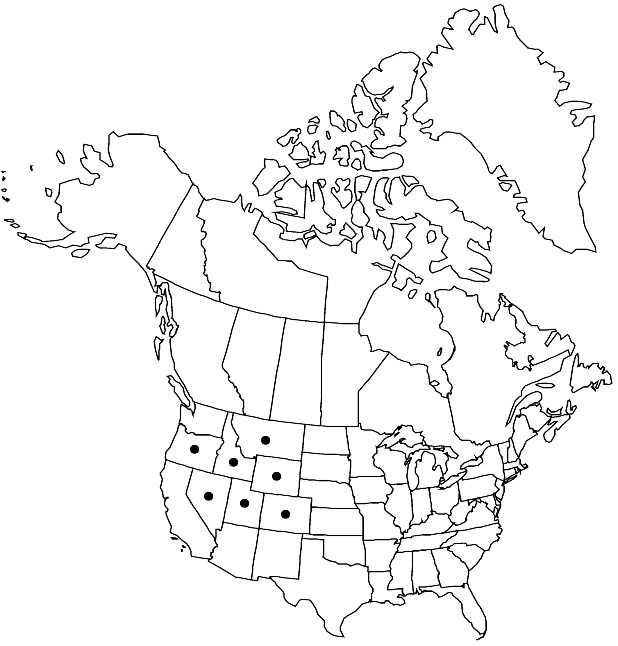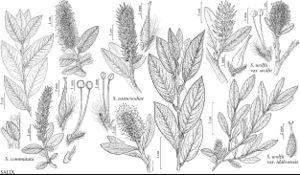Difference between revisions of "Salix wolfii var. wolfii"
FNA>Volume Importer |
imported>Volume Importer |
||
| (6 intermediate revisions by 2 users not shown) | |||
| Line 1: | Line 1: | ||
{{Treatment/ID | {{Treatment/ID | ||
|accepted_name=Salix wolfii var. wolfii | |accepted_name=Salix wolfii var. wolfii | ||
| − | |accepted_authority= | + | |accepted_authority= |
|publications= | |publications= | ||
| + | |special_status={{Treatment/ID/Special_status | ||
| + | |code=F | ||
| + | |label=Illustrated | ||
| + | }}{{Treatment/ID/Special_status | ||
| + | |code=E | ||
| + | |label=Endemic | ||
| + | }} | ||
|basionyms= | |basionyms= | ||
|synonyms= | |synonyms= | ||
| Line 20: | Line 27: | ||
|distribution=Colo.;Idaho;Mont.;Nev.;Oreg.;Utah;Wyo. | |distribution=Colo.;Idaho;Mont.;Nev.;Oreg.;Utah;Wyo. | ||
|discussion=<p>Hybrids:</p><!-- | |discussion=<p>Hybrids:</p><!-- | ||
| − | --><p>Variety wolfii forms natural hybrids with Salix boothii.</p> | + | --><p>Variety wolfii forms natural hybrids with <i>Salix boothii</i>.</p> |
|tables= | |tables= | ||
|references= | |references= | ||
| Line 29: | Line 36: | ||
-->{{#Taxon: | -->{{#Taxon: | ||
name=Salix wolfii var. wolfii | name=Salix wolfii var. wolfii | ||
| − | + | |authority= | |
| − | |authority= | ||
|rank=variety | |rank=variety | ||
|parent rank=species | |parent rank=species | ||
| Line 43: | Line 49: | ||
|publication title= | |publication title= | ||
|publication year= | |publication year= | ||
| − | |special status= | + | |special status=Illustrated;Endemic |
| − | |source xml=https:// | + | |source xml=https://bitbucket.org/aafc-mbb/fna-data-curation/src/2e0870ddd59836b60bcf96646a41e87ea5a5943a/coarse_grained_fna_xml/V7/V7_108.xml |
|genus=Salix | |genus=Salix | ||
|subgenus=Salix subg. Vetrix | |subgenus=Salix subg. Vetrix | ||
Latest revision as of 22:30, 5 November 2020
Plants 0.5–2 m. Stems: branches red-brown or violet, pubescent to glabrescent; branchlets yellow-brown or yellowish, sparsely pubescent or densely long-silky, hairs straight, wavy, curved, or crinkled. Leaves: petiole convex to flat, or shallowly grooved adaxially, 3–5.6 mm, pubescent or long-silky adaxially; largest medial blade narrowly oblong, narrowly elliptic, elliptic, or oblanceolate, apex acute, acuminate, or convex, abaxial surface pubescent, short-silky, or villous, adaxial sparsely to densely short- to long-silky, or villous; juvenile blade short- to long-silky or villous abaxially. Catkins: pistillate moderately or very densely flowered, subglobose or globose, 8.5–19 × 7–12 mm, flowering branchlet 1–7 mm; floral bract 0.8–1.6 mm. Staminate flowers: abaxial nectary (0–)0.1–0.2 mm, adaxial nectary 0.4–0.5 mm. Pistillate flowers: adaxial nectary oblong, 0.4–0.8 mm, shorter to longer than stipe; stipe 0.2–0.9 mm; ovary glabrous; ovules 10–12 per ovary; stigmas flat, abaxially non-papillate with rounded or pointed tip. 2n = 38.
Phenology: Flowering early-mid Jun.
Habitat: Stream banks, springs, wet meadows, bogs
Elevation: 2000-3800 m
Distribution

Colo., Idaho, Mont., Nev., Oreg., Utah, Wyo.
Discussion
Hybrids:
Variety wolfii forms natural hybrids with Salix boothii.
Selected References
None.
